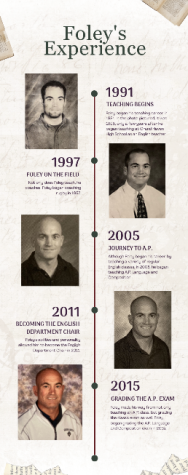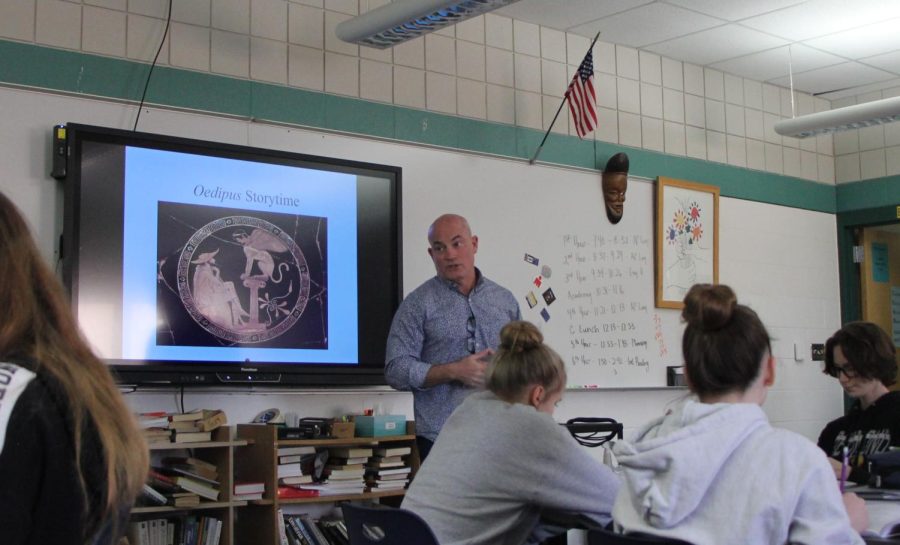Tom Foley: An English Teacher Dedicated to Teaching his Students to Think
March 14, 2023
As you walk into room 7207, you’ll notice a desk in the corner; a very organized and spacious one at that. This particular area belongs to English teacher Tom Foley. You can often find him seated at this desk each morning before school starts, sitting calmly and thinking. This is something that Foley does often. And not only does he do this, he always encourages his students to do the same.
“I don’t care what you think I just care that you think and that you can express your ideas and your opinions, both verbally and in writing,” Foley said. “The greatest thing about the liberal arts is that we teach students to think and that’s so transferable to whatever they’re going to apply it to.”
Foley spent most of his first two years of college undeclared. Going into school, he wasn’t exactly sure what he wanted to do with his life, so he took a variety of classes until it was time for him to make a concrete decision on what he wanted to major in. He studied at Northern Michigan University because he wanted to get away from home for a bit and explore new territory.
The school also had a rugby team, which was a big part of Foley’s decision to attend.

At the end of his sophomore year, he decided to major in Secondary Education with an English emphasis.
Foley started his teaching journey in Green Bay, Wisconsin, where he student-taught for a few years. He then began subbing in Coopersville until a job opened up for an English teacher at Grand Haven High School where he has been working since 1994.
He has now been teaching for thirty-two years, having taught English classes of many varieties. But AP Lang has been his favorite class to teach thus far.
“AP Lang is my favorite,” Foley said. “I like working with the juniors [and] I like the nonfiction argumentative aspect. Not only the readings that we do, but the style of writing is more my preference. I like that a big part of AP Lang is trying to figure out the exam. What can I teach my students to make them successful? And the rewards are, for the most part, almost immediate. At the end of the year, we know if I was successful or not based on the exam scores.”
Foley’s ways of teaching have been known to be very flexible and eye-opening according to some of his AP Lang students.
“Before AP lang, I wasn’t a big fan of English class, but Mr. Foley’s class changed that, and now I look forward to the class discussions every day,” junior Sofiia Svyryd said. “His teaching style is very fitting for an English class. He is a very supportive person [and] is always ready to listen and give advice to his students.”
Not only does Foley’s teaching style positively impact his student’s views of him, but Foley’s personality also plays a big role.
“I think he’s just a really nice guy who’s really open and interested in hearing our opinions,” junior Nora Jacobson said.
Foley always makes sure that he is available for his students and always tries to understand everybody’s point of view on different topics, creating a welcoming classroom environment. Since he is someone who was positively impacted by his English teachers in high school, Foley knows how important it is to have supportive, kind teachers, and so he applies that to his teaching each and every day.
Not only has Foley’s caring nature been seen by students, his fellow colleagues notice it as well.
“I think that [Foley] is very focused,” English teacher Brenda Wunder said. I think that he is very strong in his opinions on his desire to support both his students and fellow staff members. And I think that he is very driven.
The learning has gone both ways. Teaching has also helped Foley learn a lot about himself as a person.

“Teaching has taught me a lot about empathy,” Foley said. “Empathy is huge, right? I see one hundred and fifty-plus students a day and I have for the last thirty-plus years. And so trying to understand where people are coming from, what they bring with them and what their goals are, [also] what their goals aren’t. And so [it] teaches empathy. It teaches you a lot about people, whether that’s students, staff, or administrators.”
For Foley, it’s not always about agreeing with one another, but at least hearing people out and trying your best to understand where people are coming from.
“When it comes down to it, it’s taught me that people really want the best for each other and themselves,” Foley said. And that doesn’t necessarily mean you [will] always agree, whoever they may be; people, for the most part, have similar views, but getting there doesn’t always necessarily follow the same path.

